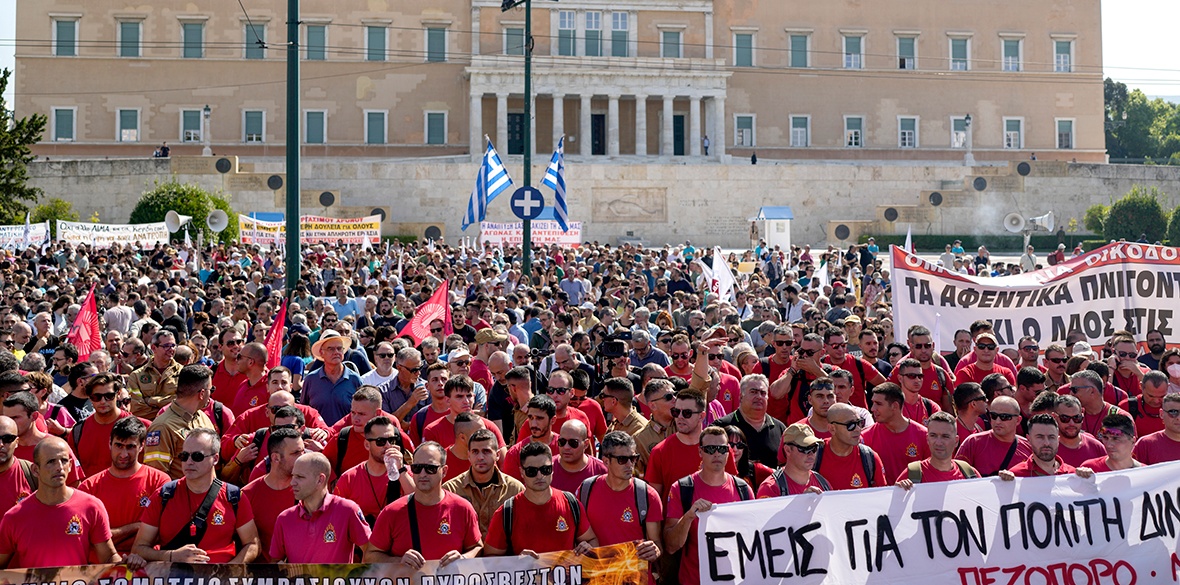This is the last article you can read this month
You can read more article this month
You can read more articles this month
Sorry your limit is up for this month
Reset on:
Please help support the Morning Star by subscribing here
BARRING an act of god the next leader of the once radical-left Syriza party in Greece will be a multimillionaire shipping boss come Sunday night.
You read that right. Businessman Stefanos Kasselakis, who campaigned for Joe Biden in preference to Barack Obama in 2008, had nothing to do with Syriza until he launched his candidacy for leader in August. That followed the announcement by Alexis Tsipras that he was standing down in the wake of terrible election results in June.
In the first round last Sunday Kasselakis took 45 per cent of the vote, which is of members and registered supporters. The perceived continuity candidate Efi Achtsioglu got 36 per cent. Kasselakis is sure this Sunday to get the 8 percentage points of a once powerful cabinet minister who has endorsed him.
Essentially, a Greek version of France’s investment-banker president Emmanuel Macron has popped up overnight, but not out of creating a bespoke, personal party of the capitalist centre. This time, it is by being elected through the plebiscitary mechanisms of a party that a decade ago the European business media warned was a grave threat – what with its roots in historic Greek communism and with a leading body called a central committee.
What has happened? There are the proximate causes of the last few months. But there are deeper reasons that should be of concern to the radical left more widely. That is because a decade ago Syriza was held up as the leading model by most of those to the left of Blairised social democracy of how to break through.
That prestige grew when it entered government in 2015. There were enormous hopes that Greece would rupture with the EU-imposed austerity regime and in so doing usher in a new phase of socialist and working-class advance.
Within six months the government capitulated to the Troika of the EU, European Central Bank and International Monetary Fund.
There was a bitter wave of disillusion across the international left. Even so, few would have thought that matters would become as bad as they are today. Many have responded since 2015 by almost repressing the memory of the trauma of capitulation and then betrayal over principles such as refugee rights. Repressed trauma is not healthy.
And it prevents dealing with the problems that caused it to begin with. It is especially important to deal with those because there is now nothing short of a crisis for the radical left way beyond Greece. Corbynism has collapsed.
The insurgency of the Bernie Sanders movement has gone over to the conventional lesser-evilism of backing the Democratic Party and Joe Biden without even pretending to influence their policies.
Die Linke in Germany has suffered a severe electoral decline while the fascistic Alternative for Germany (AfD) now polls over 30 per cent in the eastern regions that were once radical left bastions.
Huge pressure to get behind Nato in Ukraine has led to the weakening of the party’s historic peace stance. As in the US, there is a danger that it is opportunists of the radical right rather than the left who will tap popular feeling against the Ukraine war.
Nato and Ukraine are being used by the forces of the centre to liquidate the radical left and re-present enfeebled social democracy as the only game in town for the labour movement.
The concession is that we get to voice displeasure at the German Greens voting to reopen coal mines or the British Labour Party promising little, and often reneging on even that the following week. But we cannot do anything about it politically. Look at Greece and what happened there.
If the radical left is to have a future, we do have to look at it.
The immediate backdrop is the disastrous election results for the left in June. Only the Communist Party improved its vote. It is not just that the centre-right New Democracy Party (ND) won outright and three far-right parties got MPs.
Flattered as modernising and liberal in mainstream international coverage, ND leader Kyriakos Mitsotakis has in fact pressed hard-right themes alongside his business image. He baselessly accused migrants in Greece of setting devastating fires this summer.
Unlike in previous elections, this time the right was able to win or make big gains in electoral districts that previously delivered hefty left majorities even when the country overall voted for New Democracy.
Mitsotakis’s message was that the last four years of (very limited) economic recovery had not yet delivered on wages and on the health system. These would be priorities for the next four years. (A big hostage to fortune that is already apparent in strikes this week).
A vote for Syriza, he said, would threaten all that. He pointed to the turmoil of eight years ago.
Syriza had no answer. It had long retreated to running a campaign limited to attacking cronyism and government scandals – such as phone tapping. It hoped to be borne aloft by popular outpouring over, for example, February’s disastrous train crash when hundreds of thousands protested.
But four years of failing to oppose the government over fundamentals, such as privatisation that underlay the rail disaster, but instead appealing to the administrators and professionals as a safe pair of hands, led Syriza to an annihilating defeat.
Alienating supporters with residual hopes of radicalism and not convincing capitalist-minded strata who will never forget the fear they had for their property in 2015 and the party’s communist past, Syriza pleased nobody.
Incongruous as it may seem, there is a continuity here with the party in what may be called its heroic phase.
To see that we need to look at the realities of a decade ago and not various projections of the time. The spine, DNA and core apparatus of Syriza was always clear that it sought not a revolutionary rupture with capitalism but a left reforming government.
By not going “too far, too quickly” — a mistaken lesson from the Chilean experience — it would be able to navigate ruling-class opposition while enthusing popular support.
There was a variegated left that was more radical. There were those who put greater emphasis in the strategy for change upon social movements and direct class struggle. They warned of the pressures of what Marxist sociologist Nikos Poulantzas in the 1970s had called “statification” of the party through parliament and participation in government.
There were debates and tendencies. But none of that permitted the wild projections onto the party that some made. Citing opaque discussions in the Communist International in 1922 about the role of a “workers’ government” in a bourgeois state as a possible prelude to Russian-style revolution was totally beside the point.
The reason? Syriza was definitive that it had no such revolutionary perspective in which the first act of such a hypothetical workers’ government would be to “disarm the bourgeoisie and arm the organised working class.”
The actual historical reference points were closer in time. They were in the approaches of the left social-democratic governments in the early 1980s of Francois Mitterrand in France and Andreas Papandreou in Greece.
The positive reforming phase of the first lasted 18 months; the second, a little over two years. Both were brought down by domestic ruling-class and state opposition in conjunction with international capitalist pressure.
Syriza’s positive phase in government lasted only six months – for similar reasons, all the sharper in conditions of profound national crisis.
Syriza made fundamental concessions. It gave key ministries to those wholly aligned with the state machine that had done all it could to stop it being elected. In a modern economy, the central bank is more important in destabilising a government, at least initially, than the armed forces. Liz Truss found that out this time last year.
The head of the central bank remained in place to work with his unelected eurozone counterparts against the elected government of Greece.
Formulations of “creative ambiguity” promising “no sacrifice for the euro” but not leaving the euro either collapsed as conference-composited motions met hard reality.
Similarly with talk of combining parliamentary and extra-parliamentary action. There is nothing wrong with seeking to do so. The issue arises when there is the potential for extra-parliamentary mobilisation to go beyond the strict limits of parliament and call into question the state. That is what mobilising the referendum majority against the Troika would have meant in July 2015.
Those were antiquarian issues, we were assured by people who said Syriza had transcended previous dilemmas. That is what some socialists said about Mitterrand as well. The grand historical dilemmas resurfaced. Even the possibility of forming a government meant they hammered into the Corbyn leadership of the Labour Party.
It is only with that in mind that we can draw positively from this experience. There are trite answers. One is to fall into a sectarian propagandism linked to apolitical activism that retreats from the strategic necessity of giving political expression to working-class interests.
Another is just to try the same thing again, on more ambiguous grounds and with the same strategic evasions. But smaller, and also more conventional. Another normal party but with left-wing policies.
Despite the proclamations of the capitalist centre, however, the insurgent mood that parts of the left were able to channel in the middle of the last decade has not gone away. One in three voters in Europe are choosing parties that at least pose as anti-Establishment.
The lion’s share is going to the radical right. The left cannot just abandon that sphere. Through building united fronts of social struggle and resistance we have also to begin to pose a political answer that is prepared to confront the historic challenges of challenging capitalist rule, rather than pretend to people that they have disappeared – only then to bring the most profound demoralisation.












